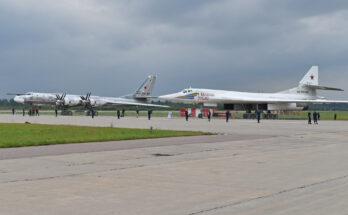The Russian defense industry will begin working on the development and production of intermediate-range missiles following the U.S. decision to withdraw from the Intermediate-Range Nuclear Forces (INF) Treaty.
On February 2, 2019, Russian President Vladimir Putin announced the beginning of work on intermediate-range weapons, pointing to American development of similar systems. He said that the U.S. “has announced research and development works, and we will do the same.” He added, “I agree with the Defense Ministry’s proposals to start the work on ‘landing’ Kalibr missiles and developing a new area to create a land-based hypersonic missile with intermediate range.”
Both the U.S. and Russia are withdrawing from the INF Treaty, a bilateral agreement signed in 1987. The INF Treaty sought to restrict the two powers’ short- and intermediate-range missiles, banning deployed and non-deployed ground-based systems of ranges from 500 to 5,500 kilometers. In July 2014, U.S. President Barack Obama’s administration sent a letter to the Russian side accusing the Russian government of violating the treaty with the development of a new cruise missile.
That missile, later identified as the 9M729, is a ground-based version of the Kalibr, a naval cruise missile. According to the U.S., Russia conducted tests of the 9M729 from both fixed and mobile launchers. Flight-testing from the fixed launcher achieved a range of over 500 kilometers, while Russia flight-tested the missile from mobile launchers at ranges under 500 kilometers. While the INF Treaty permits the testing of missiles from fixed launchers if they are intended for use on a naval or aerial platform, Washington said that the two types of tests indicated that the 9M729 was intended for deployment on land-based systems, violating the INF Treaty.
Russia has rejected the American claims and put forward its own accusation that the U.S. is in violation of the treaty. The Russian Defense Ministry said on February 2, “Two years before making public unfounded accusations against Russia of alleged INF Treaty violations, Washington not only took a decision, but also started preparations to production of missiles of intermediate and shorter range banned by the Treaty.”
The two sides have held dialogue in an effort to preserve the treaty, but, over the weekend, both Moscow and Washington announced their decisions to leave the treaty. U.S. Secretary of State Michael Pompeo said in a statement, “The United States has gone to tremendous lengths to preserve the INF Treaty, engaging with Russian officials more than 30 times in nearly six years to discuss Russia’s violation, including at the highest levels of government.” His statement followed an ultimatum from the U.S. in early December that Russia had 60 days to destroy the 9M729.
Dialogue between Washington and Moscow over the INF Treaty may continue, but, with the two sides announcing plans to withdraw, both are free to move forward with the development of ground-based missiles. Russian President Putin’s decision over the weekend paves the way for a ground-based version of the Kalibr to enter Russian service. The system, according to Russian media, could carry a range of around 2,600 kilometers.
Military markets analyst, covering Eurasia, Middle East, and Africa.




